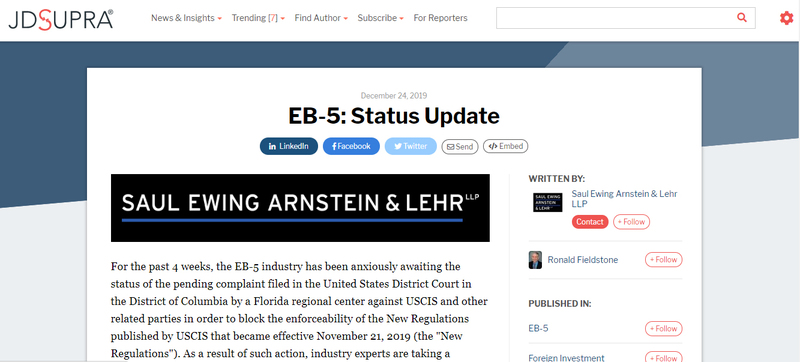For the past 4 weeks, the EB-5 industry has been anxiously awaiting the status of the pending complaint filed in the United States District Court in the District of Columbia by a Florida regional center against USCIS and other related parties in order to block the enforceability of the New Regulations published by USCIS that became effective November 21, 2019 (the "New Regulations"). As a result of such action, industry experts are taking a precautionary standpoint in analyzing how to deal with investors who would otherwise invest at a $900,000 level, assuming that the new TEA standards have been satisfied (meaning only actual project census tract combined with an adjacent census tract or tracts).
To make matters more confusing, there is also pending legislation [the Immigration Investor Program Relief Act (2778)] (the "New Legislation") for which it is difficult to predict the ultimate conclusion and the timetable related thereto given past practices. However, this seems to be a significant impetus to try to get a bill passed in the near future. The pending bill provides for a 90-day grace period with respect to the enforceability of the New Legislation. Therefore, if an investor would file his or her I-526 petition prior to the New Legislation becoming effective, then absent the New Regulations being enjoined by Court order or otherwise voluntarily postponed by USCIS, the result would be that the $900,000 amount would otherwise be required if the New Legislation is passed that does not address petitions filed between November 21, 2019 and the effective date of New Legislation. Accordingly, it would be advantageous to try to have an I-526 petition filed that would take into account the potential change in the dollar investment amount based upon either the blockage of the New Regulations or New Legislation that may be adopted.
It is difficult to predict the status of the current legislation or whether the Plaintiff and USCIS will ultimately reach a settlement with respect to the New Regulations that could possibly result in a delay in the enforceability in the New Regulations or, otherwise, potentially modify the Regulations if a settlement is reached. Otherwise, it is anticipated, based on the current trial calendar, that briefs will be filed and the Court will provide a ruling sometime in February.
Based upon the above, we are cautiously analyzing the status of matters and advising clients to proceed with fundraising, subject to the potential for reimbursement if the New Regulations are enjoined or postponed or New Legislation is adopted that only has a prospective application and not otherwise affect I-526 petitions filed prior to the enactment of the New Legislation. The key here is to not prejudice those investors that commit to the funding of $900,000 as to their ability to potentially reduce the funding amount to $500,000. At this time it is difficult to predict what position USCIS will take in such event.
Hopefully, these issues will become clarified within the next 60 days.
https://www.jdsupra.com/legalnews/eb-5-status-update-29936/
Mentions
States
- Florida
Securities Disclaimer
This website is for informational purposes only and does not constitute an offer or solicitation to sell shares or securities. Any such offer or solicitation will be made only by means of an investment's confidential Offering Memorandum and in accordance with the terms of all applicable securities and other laws. This website does not constitute or form part of, and should not be construed as, any offer for sale or subscription of, or any invitation to offer to buy or subscribe for, any securities, nor should it or any part of it form the basis of, or be relied on in any connection with, any contract or commitment whatsoever. EB5Projects.com LLC and its affiliates expressly disclaim any and all responsibility for any direct or consequential loss or damage of any kind whatsoever arising directly or indirectly from: (i) reliance on any information contained in the website, (ii) any error, omission or inaccuracy in any such information or (iii) any action resulting therefrom.




